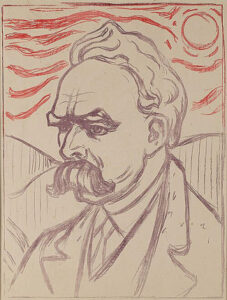We Clever Dwarfs
We have
accustomed ourselves
to believe
in two kingdoms,
the domain of purposes and volition,
and the domain of chance.
In this latter domain
everything is done senselessly,
there is a continual going to and fro
without any one being able to say
why or wherefore.
We stand in awe
of this powerful realm
of the great cosmic stupidity,
for in most instances
we learn to know it
when it falls down upon the other world,
that of aims and intentions,
like a slate from a roof,
always overwhelming
some beautiful purpose
of ours.
We clever dwarfs,
with all our will and aims,
are interfered with, knocked down,
and very often crushed to death
by those ultra-stupid giants,
the accidents,
—but in spite of this
we should not like to be deprived
of the fearful poetry
of their proximity,
for these monsters
very often make their appearance
when life in the spider’s web of definite aims
has become too tiresome or too anxious for us,
and they sometimes bring about a divine diversion
when their hands for once
tear the whole web in pieces,
—not that these irrational beings
ever intend to do what they do,
or even observe it.
But their coarse and bony hands
rend our web as if it were thin air.
Moira
was the name
given by the Greeks
to this realm
of the incalculable and of sublime…
Daybreak by Friedrich Nietzsche, trans. by John McFarland Kennedy, #130

I read the passage yesterday. ‘This is it,’ an inner voice whispered. You must feature these lines in tomorrow’s post. Nietzsche has been a guide, a mentor for me. Nietzsche regarded misfortune, those wild, idiosyncratic maladies, when things are not as you’d wish, and you can’t get what you want, no matter the intention of your choices – as an instruction. Nietzsche paid attention, the lesson was delivered many times, in many forms – and he wrote book after book over the course of his adult life.
He taught at the University of Basil for ten years but retired early due to failing health. He had served in the Franco-Prussian war as a medical orderly where he contracted diphtheria and dysentery. While a professor at Basil Nietzsche observed Otto von Bismarck and the establishment of the German Empire.
Nietzsche knew about war, the brutal havoc of battle, and he knew a thing or two about monsters. He is widely regarded as a first rate philosopher, a thinker who did not flinch to say/write out loud the consequences of ideals held to be sacrosanct, that everyone else is loath to criticize. Over approximately seventeen years as a solitary writer Nietzsche suffered bouts of depression. He finally fell into mental collapse in 1889.
He also was a poet, he knew how to dance with a pen. This is obvious from the language in this passage. His vivid phrasing has become prescient of the death spiral of democracy and of America at present: a web rent by coarse and bony hands, we clever dwarfs, a monster as an ultra-stupid giant.
“Enjoy” is not exactly the word I want to use. But do mindfully absorb the painterly prose by which Nietzsche describes our situation.